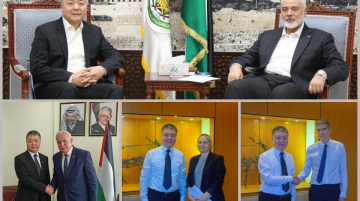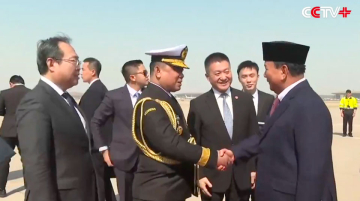
This article is co-authored by Yeta Purnama, a researcher at the Center of Economic and Law Studies (CELIOS), and Muhammad Zulfikar Rakhmat, Director of the China-Indonesia Desk at CELIOS.
China’s growing role in global peacekeeping, especially regarding Middle East affairs, has garnered increasing appreciation from the Global South. The West’s inadequate measures in facilitating peace negotiations have paved the way for China’s emergence as a credible alternative. Unlike Western powers, which often display biases towards a certain side, China is viewed as a more neutral mediator in the region’s complex dynamics.
Recently, China successfully facilitated a meeting uniting 14 Palestinian factions, including Hamas and Fatah, two ideological rivals long divided. This achievement marks a significant step towards fostering internal Palestinian unity during a critical time. On July 27, 2024, China announced the culmination of these efforts through the Beijing Declaration, a national unity agreement aimed at bolstering Palestinian governance in Gaza.
Hamas, known for its violent opposition to Israeli sovereignty, maintains control over the Gaza Strip, home to approximately 2.3 million people. It adopts a confrontational stance, leading to Israeli-imposed blockades and stringent measures. In contrast, Fatah pursues a more diplomatic approach, advocating for a two-state solution and recognizing Israel’s legitimacy.
The Beijing Declaration has three key points: First, achieving an immediate comprehensive, stable, and sustainable ceasefire in Gaza and ensuring humanitarian aid access on the ground. Second, jointly striving to establish post-conflict governance in Gaza based on the principle of Palestinians governing themselves. Third, advocating for full Palestinian membership in the UN and initiating the implementation of a two-state solution.
The Beijing Declaration represents a significant political triumph for China as it fully displays its staunch advocacy for the Palestinian cause and commitment to fostering peace and justice in the Middle East. China’s consistent support, extensive development projects, and humanitarian aid in Palestinian territories reaffirm its dedication to advancing peace and progress. This declaration not only enhances China’s diplomatic influence but also positions it as a key player in shaping Middle Eastern geopolitics.
Conversely, the U.S. and Israel have voiced strong opposition to the Beijing Declaration, maintaining their stance on Hamas as a terrorist organization and emphasizing previous agreements as crucial to Israel’s security.
Despite this resistance, many countries, particularly in the Global South and international bodies, view the declaration optimistically. They perceive it as a potential catalyst for Palestinian reconciliation and renewed peace initiatives, emphasizing the importance of constructive dialogue and diplomatic engagement in securing Palestinian rights and safety.
This development also presents an opportunity for China and Indonesia to collaborate in mediating the Palestinian conflict.
Indonesia-China Synergy for Palestine
Indonesia has expressed support for the recent development in Beijing and hopes that the agreed-upon points will be effectively implemented. This stance reflects Indonesia’s longstanding vocal advocacy for the Palestinian cause in various international forums.
Indonesia has also provided humanitarian aid and other forms of assistance rooted in its foreign policy objectives to eliminate colonialism and uphold the principles of the Asia-Africa Conference agreements. This steadfast approach has solidified Indonesia’s reputation as a staunch defender of Palestine.
Indonesia’s support also stems from its aspiration to serve as a global mediator through diverse diplomatic channels. Over the years, Indonesia has actively engaged in significant global issues, such as those concerning Afghanistan and Palestine.
This year, the Palestinian issue has been a key topic in bilateral discussions between Beijing and Jakarta, providing an opportunity for the two countries to align their views and enhance Indonesia’s close economic, social, and cultural ties with China.
During the visit of Chinese Foreign Minister Wang Yi to Indonesia in April 2024, discussions were held on collaborating to find a resolution to the Israeli-Palestinian conflict. Indonesian Foreign Minister Retno Marsudi affirmed Indonesia’s alignment with China’s perspective on the Palestinian issue, advocating strongly for a fair two-state solution. Both countries also expressed support for a ceasefire between the conflicting parties.
This commitment was again endorsed by statements from Wang Yi and Retno Marsudi confirming their support for Palestine’s bid for full membership in the United Nations.
As a country with the largest Muslim population globally, Indonesia wields substantial potential to influence other Muslim nations in fostering robust solidarity and effective conflict resolution, particularly concerning Palestine. Indonesia’s status as a leading Muslim-majority nation confers strategic advantages in political and diplomatic influence within the Muslim world. Leveraging this influence, Indonesia can unify Muslim countries to speak with a coordinated voice in international forums, both bilateral and multilateral.
Moreover, Indonesia can serve as a bridge-builder among Muslim nations, facilitating consensus on a unified approach to conflict resolution and fostering regional and international cooperation for peace initiatives. Its significant sway in the global Muslim community enables Indonesia to promote closer dialogue and collaboration between Muslim countries and international organizations dedicated to conflict resolution.
China, known in Indonesia for its pro-Palestinian stance in the face of great powers’ support for Israel and lack of a contentious history in Middle Eastern conflicts, is perceived as an objective and trustworthy mediator. This could offer China an opportunity to build trust with the diverse parties involved in the Palestinian-Israeli conflict. Additionally, China’s substantial economic and military capabilities position it well to invest in development projects, provide humanitarian aid, and support sustainable solutions for post-conflict reconstruction and stabilization.
Based on the above factors, China and Indonesia present themselves as credible mediators for global and Palestinian peace. Their strong bilateral relationship enhances their combined influence and effectiveness in collaboratively promoting peace initiatives.
Some Notes to Resolve
Indonesia and China must orchestrate their efforts toward achieving peace in the Middle East, particularly addressing the protracted Israeli-Palestinian conflict. But there are a few things to iron out first.
China, having cultivated significant relationships across various Middle Eastern countries, should consider scaling down its economic and diplomatic engagements with Israel. This step is essential for China to adopt a more balanced stance and support deeper initiatives aimed at fostering dialogue between the conflicting parties. By minimizing perceived biases in its engagements, China can bolster its credibility as a neutral mediator and garner greater acceptance from all stakeholders involved.
Meanwhile, Indonesia, steadfast in its support for Palestinian rights and advocacy for a two-state solution, should maintain its principled stance in foreign policy. Indonesia’s consistent refusal to establish bilateral relations with Israel underscores its commitment to solidarity with the Palestinian people. This stance not only reinforces Indonesia’s moral authority on the global stage but also helps build a broader coalition among nations supporting Palestine.
Additionally, while China and Indonesia have made sustained efforts to mediate the Israeli-Palestinian conflict over the years, achieving tangible progress remains elusive. Therefore, it is crucial to continually evaluate these efforts to ensure they transcend mere diplomatic gestures and genuinely contribute to easing tensions.
Another critical aspect is solidifying a credible position in supporting peace in the Middle East, including tidying up the mess in our own backyards.
Indonesia and China should address unresolved regional conflicts closer to them, such as tensions in the South China Sea. Resolving such conflicts within their respective regions is vital, as unresolved disputes can undercut their effectiveness as mediators elsewhere.
Just days after endorsing the Beijing Declaration, Indonesian Foreign Minister Retno Marsudi emphasized the importance of China’s active role in promoting regional stability and peace during the ASEAN-China Post-Ministerial Conference (PMC) in Vientiane, Laos, on July 26, 2024. Her remarks may have subtly alluded to concerns over China’s assertiveness in the South China Sea.
Indeed, ensuring a stable regional environment would strengthen the effectiveness of mediation efforts in other conflict-prone regions.





